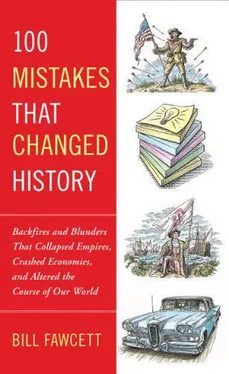By April 19, it was apparent that the landing was a failure and that the rebels could not hold out much longer. The CIA handlers had gone back to the boats of their “Cuban Navy,” which were waiting offshore and loaded with ammunition and weapons. One attempt was made to get to the beach with the needed ammunition, but the convoy turned back when the leader of the 1,500 rebel Cubans surrendered before the first boat arrived. The Cuban army rounded up 1,189 invaders and found 114 dead. A year later, President Kennedy ransomed the survivors from Castro for a payment of $59 million.
The failure of the Bay of Pigs landing was likely inevitable given the changes to the plan. So perhaps the greatest mistake, among the many, was Kennedy simply approving the landings at all or Bissell proposing it. Kennedy’s had been a political decision, and he paid little attention to the military concerns. Certainly when JFK refused to support the landings with any American forces, he eliminated any chance of success or even survival by those Cubans who were risking their lives and freedom at the CIA’s behest.
Had this been handled differently, there would have been a good chance that, if shown a viable alternative, the Cuban people would have thrown an increasingly more repressive Castro government out. The inaction by Russia during the entire drama demonstrated their unwillingness to get involved. But the plan did fail, and Cuba in 2009 remains one of the last communist regimes. Another consequence of this failure was a near-nuclear war. The Russians were emboldened by the stumbling reactions of President Kennedy, and they then felt free to establish nuclear missile bases in Cuba. Kennedy, having learned his lesson on being fainthearted, took a strong stand regarding the Cuban-based Russian missiles, and many experts say that both superpowers were just a few misunderstandings or missteps away from complete mutual atomic destruction. Had the plan worked as it had in Guatemala, the Western Hemisphere would be very different. A capitalistic Cuba may have discouraged many communist insurrections in Central and South America. Would there be a Hugo Chávez today if Kennedy had not lost his nerve?
92. PUT UP WITH THIS MISTAKE
Sticky Problem
1968
In 1968 a scientist at 3M named Spencer Silver decided to work on improving one of the most successful of that company’s products, adhesive tape. What was needed was a better glue that held more firmly, but still allowed the tape to be removed. By 1970, he had instead developed something very different, but of no use to adhesive tape. What Silver had managed to produce was a glue that was easy to remove but had only weak sticking power. Interesting, but seemingly a failure if there were no commercial uses for it. Four years passed, and then a colleague of the scientist commented that he was frustrated that the small sheets of paper he used to mark that day’s songs in his hymnal would fall out. The friend didn’t want to use tape because he was worried about harming the book’s pages. Finally there was a use for the weak glue that had been a mistaken result four years earlier. By 1980, the Post-it note was found in offices all over the world.
Watergate
1973
Mired in a political scandal that threatened to destroy his presidency, Richard Nixon famously declared, “I am not a crook,” in a televised Q and A session with 400 Associated Press managing editors in November 1973; while he never recanted such words, the enormity of evidence suggesting he was a crook left a permanent blemish on Nixon’s presidency. As a result of the Watergate scandal, Nixon became not “the president who ended Vietnam” or “the president who oversaw large-scale racial integration” or even “the president who helped take America to the moon.” Nixon instead became “the president who resigned to avoid being justifiably impeached.”
The scandal initially looked like a mere robbery. On July 17, 1972, a security guard at the Watergate Office Complex—where the Democratic National Headquarters was located—noticed that tape was covering several doors to keep them unlocked. He removed the tape and continued his shift, but when he noticed that the doors had been retaped, he phoned the police. Five men were arrested and later indicted, along with two others, for conspiracy and burglary. The burglars had on their persons and in their hotel rooms thousands of dollars of cash that could be traced back to the 1972 Committee to Reelect the President, a fund-raising organization for the Nixon administration that was given the pejorative acronym CREEP by his opponents. This connection between the committee and the burglary earned the burglary considerable media attention. The scandal became the subject of an investigative journalism project spearheaded by Washington Post reporters Bob Woodward and Carl Bernstein, who relied largely on anonymous sources. Their correspondence with a source referred to as “Deep Throat” (revealed in 2005 to be former FBI Associate Director William Mark Felt) suggested that the burglary and its coverup had ties to the FBI, the Justice Department, and even the White House. This fueled a broader investigation that did not end with the burglars’ convictions. It was not long before Nixon asked for the resignation of some of his closest aides implicated in the scandal, H. R. Haldeman and John Ehrlichman. He also fired White House Counsel John Dean, who would later become a witness against Nixon.
Hearings held by the Senate garnered substantial media coverage; the majority of Americans saw some segment of the hearings between May 17 and August 7. It was learned during the hearings that all conversations held inside the Oval Office were recorded. Archibald Cox, a special counsel in the Justice Department charged with examining the Watergate scandal, subpoenaed the tapes; Nixon refused, citing executive privilege and issues of national security, and ordered Cox to withdraw the subpoena. Nixon offered Cox a rigged compromise: John C. Stennis, a famously hard-of-hearing Senator from Mississippi, would review the tapes and summarize them for the special prosecutors. When Cox refused, Nixon forced the resignation of Attorney General Elliott Richardson. The attorney general had been appointed just two months before, and he refused to comply with Nixon’s demand to fire Cox. Richardson was replaced with Robert Bork. Bork reluctantly dismissed Cox and replaced him with Leon Jaworski, who picked up where Cox left off. It was this incident, dubbed by the press as the “Saturday Night Massacre,” that led Nixon to assert he was not a crook.
Jaworski did not give up. His efforts caused Nixon to attempt a compromise, releasing transcripts of the tapes with information pertinent to national security redacted. Controversy stemmed from an almost twenty-minute gap in one of the tapes. In July 1974, the Supreme Court mandated that full access to the tapes had to be granted. That same month, the House Judiciary Committee voted to recommend three articles of impeachment against the president: obstruction of justice, abuse of power, and contempt of Congress. In August, a tape was released that was deemed the smoking gun of the affair, an irrefutable piece of evidence that destroyed Nixon politically. It detailed a 1972 conversation between Nixon and Haldeman in which Haldeman described a plan to cover up the burglary by having the CIA obstruct an FBI investigation into the affair; Nixon approved the plan. That conversation, along with charges that Nixon paid blackmail money to hush conspirators, sounded the death knell for Nixon’s presidency. Nixon’s own lawyers abandoned him, and many who had been reluctant to impeach him declared that they had changed their minds.
Читать дальше












